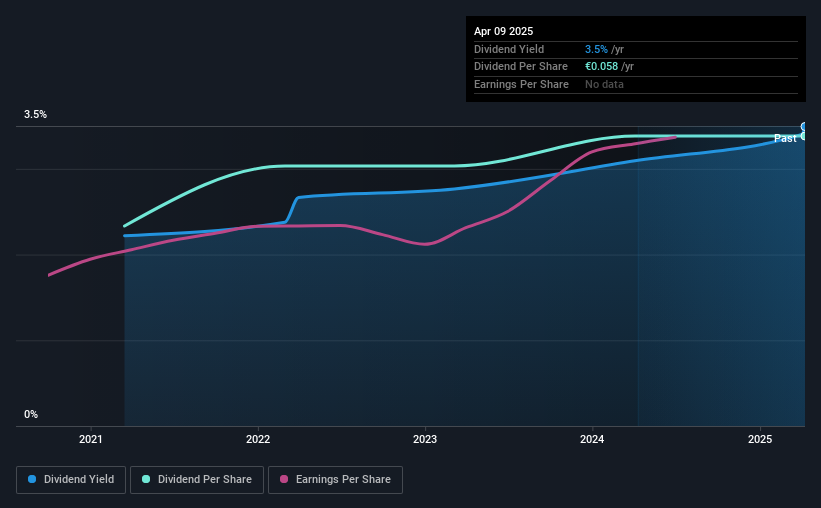There's A Lot To Like About Reti's (BIT:RETI) Upcoming €0.058 Dividend
Reti S.p.A. (BIT:RETI) stock is about to trade ex-dividend in 3 days. The ex-dividend date is usually set to be two business days before the record date, which is the cut-off date on which you must be present on the company's books as a shareholder in order to receive the dividend. The ex-dividend date is important as the process of settlement involves at least two full business days. So if you miss that date, you would not show up on the company's books on the record date. This means that investors who purchase Reti's shares on or after the 14th of April will not receive the dividend, which will be paid on the 16th of April.
The company's next dividend payment will be €0.058 per share, and in the last 12 months, the company paid a total of €0.058 per share. Based on the last year's worth of payments, Reti stock has a trailing yield of around 3.5% on the current share price of €1.66. Dividends are an important source of income to many shareholders, but the health of the business is crucial to maintaining those dividends. So we need to investigate whether Reti can afford its dividend, and if the dividend could grow.
Dividends are usually paid out of company profits, so if a company pays out more than it earned then its dividend is usually at greater risk of being cut. Fortunately Reti's payout ratio is modest, at just 46% of profit.
See our latest analysis for Reti
Click here to see how much of its profit Reti paid out over the last 12 months.

Have Earnings And Dividends Been Growing?
Businesses with strong growth prospects usually make the best dividend payers, because it's easier to grow dividends when earnings per share are improving. If earnings fall far enough, the company could be forced to cut its dividend. With that in mind, we're encouraged by the steady growth at Reti, with earnings per share up 6.0% on average over the last five years.
The main way most investors will assess a company's dividend prospects is by checking the historical rate of dividend growth. Reti has delivered 9.7% dividend growth per year on average over the past four years. It's encouraging to see the company lifting dividends while earnings are growing, suggesting at least some corporate interest in rewarding shareholders.
To Sum It Up
Is Reti worth buying for its dividend? It has been growing its earnings per share somewhat in recent years, although it reinvests more than half its earnings in the business, which could suggest there are some growth projects that have not yet reached fruition. Overall, Reti looks like a promising dividend stock in this analysis, and we think it would be worth investigating further.
On that note, you'll want to research what risks Reti is facing. Our analysis shows 2 warning signs for Reti and you should be aware of these before buying any shares.
A common investing mistake is buying the first interesting stock you see. Here you can find a full list of high-yield dividend stocks.
New: AI Stock Screener & Alerts
Our new AI Stock Screener scans the market every day to uncover opportunities.
• Dividend Powerhouses (3%+ Yield)
• Undervalued Small Caps with Insider Buying
• High growth Tech and AI Companies
Or build your own from over 50 metrics.
Have feedback on this article? Concerned about the content? Get in touch with us directly. Alternatively, email editorial-team (at) simplywallst.com.
This article by Simply Wall St is general in nature. We provide commentary based on historical data and analyst forecasts only using an unbiased methodology and our articles are not intended to be financial advice. It does not constitute a recommendation to buy or sell any stock, and does not take account of your objectives, or your financial situation. We aim to bring you long-term focused analysis driven by fundamental data. Note that our analysis may not factor in the latest price-sensitive company announcements or qualitative material. Simply Wall St has no position in any stocks mentioned.
About BIT:RETI
Adequate balance sheet second-rate dividend payer.
Market Insights
Community Narratives




